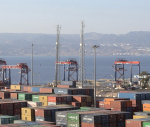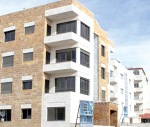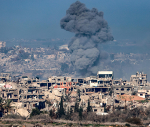You are here
Is this the normal Christmas?
Dec 23,2020 - Last updated at Dec 23,2020
Christmas is a time of joyful celebration for the people of Bethlehem, a grateful relief from the day-to-day experience of occupation and isolation. Each year, we welcome hundreds of thousands of pilgrims who come from all over the globe to visit the Church of the Nativity and celebrate where Jesus was born.
Christians, Muslims and pilgrims alike crowd the markets and exchange greetings at religious and cultural events. We give thanks for the world’s embrace. The harsh realities of life behind the annexation wall, the feelings of being forgotten, seem to fade, if only briefly and only in our imagination.
This Christmas comes at the heal of an intensified annexation process that encircles Bethlehem with illegal settlement, including thousands of settlement units recently approved for the settlements of Gilo, Har Homa and Giv’at Hamatos aimed at forever separating the twin cities of Bethlehem and Jerusalem. Such settlements are built on illegally annexed Palestinian land and represent the biggest challenge to peace, let alone to the presence of a vibrant Christian community in Palestine.
This reality of annexation, encouraged by the Trump administration, has been accompanied by an aggressive and inciting rhetoric claiming Jewish-Zionist exclusivity over this land, negating any Palestinian, Arab, Christian or Muslim connection to it, particularly with regards to Jerusalem.
This year, however, we have to add an extra layer to our situation.
The spread of COVID-19 has imposed a new occupation. Streets are empty. Shops are closed. There are no pilgrims, no mass celebrations, no festivals in Manger Square. Bethlehem’s annual tree lighting was broadcast on-line, church services from nearly empty buildings. The traditional processions of the Patriarchs of Jerusalem to Bethlehem, in which thousands take part, are limited to clergy and government officials. No marching scouts, no school bands, no bagpipes.
Instead of a season of joyful celebration, there is sadness, worry and anxiety. The economic consequences of the lack of tourism are harsh. It will take years before we recover. Many families are struggling to survive. While churches and charities share in easing this burden, they too have suffered. Our sense of isolation, metaphorically as well as physically, is stronger and deeper this Christmas.
But not unfamiliar. For millennia, people in Palestine have rarely known a time apart from occupation. From the Babylonians in the sixth century BC to the Romans in Jesus’ day to the current military regime, our history gives witness to many difficult periods. It makes me wonder: Is this our destiny in Bethlehem and Palestine? Is this the normal Christmas?
There is an answer, and hope, in the announcement carried forward by the shepherds working the fields near Bethlehem.
As a child, Jesus experienced poverty and rejection. He escaped religious extremism and the violence of the state imposed by Herod. He became a refugee in Egypt, then returned with his family to dwell in Nazareth, another unremarkable village like Bethlehem. According to the Christian tradition, his life was ended on a cross, a warning to all who would dare speak truth to power.
It is as if God is saying to those of us who are suffering under any kind of occupation; be it a pandemic, difficult relationship, physical illness, economic hardship, or systemic racism, “I stand in solidarity with you. I am Immanuel, God with you.”
This Christmas, the people of Bethlehem will miss welcoming the world to our community and sharing with them in the season’s festivals and worship experiences. Yet, with others in contexts of exclusion and marginaliSation, we will find our comfort and joy in the news that God has visited our planet, that God is with us.
Rev. Munther Isaac is pastor of Bethlehem’s Christmas Evangelical Lutheran Church and academic dean of Bethlehem Bible College in Palestine. An author, his most recent book is “The Other side of the Wall: A Palestinian Christian Narrative of Lament and Hope”. He contributed this article to The Jordan Times












